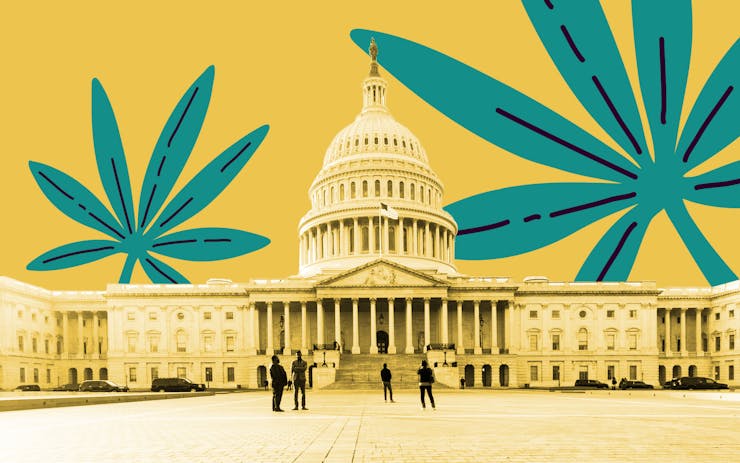Congressional support for cannabis prohibition is finally crumbling. During the last Congress, which ended Jan. 3, 2019, federal lawmakers introduced more than 60 pieces of cannabis-related legislation—more than in every prior session since prohibition began. Even more continue to roll in this year.
There are now six separate proposals in Congress that would effectively end prohibition in the United States. Some would legalize and regulate the drug nationally, while others would take a narrower approach, allowing states with legal cannabis to proceed unhindered by federal law.
Whatever passes is likely to be a mixture of ideas that will define the legal-cannabis era to come.
The influx of legalization bills is a good sign for cannabis reform’s prospects in Congress, but it can also be confusing: Why do we need so many overlapping bills, anyway? Why can’t Congress members work together on one bill to encompass everything?
The short answer: That’s exactly what they’re doing—more or less. You know that old saying about sausage and lawmaking? It’s like that. The process is messy, but if it’s done right, the result could be clean and strong, ending federal prohibition and making legal cannabis the law of the land.
Here’s a breakdown of the most promising bills in Congress that could finally shatter federal cannabis prohibition—and what to expect as they wend their way toward becoming law.
Bills Are a Dime a Dozen, Laws Can Last a Lifetime
It’s not particularly difficult for a lawmaker to introduce a bill in Congress. Most bills ultimately fall by the wayside, failing to receive enough support to earn a committee’s review, let alone a full vote.
But along the way, these bills can be amended, combined, borrowed from, or resubmitted. Their provisions can be sliced and diced and reinserted elsewhere. It’s in that flurry of activity that observers say the dozens of overlapping cannabis bills may eventually coalesce. For now, the competing measures allow lawmakers to target certain issues in particular, planting seeds that could later be incorporated into broader bills.
“If we keep moving the ball down the field, we will keep getting chances to try again and will eventually get a touchdown.”
“In some cases, lawmakers are using different bills to address different issues,” explained Daniel Shortt, an attorney at the cannabis-focused law firm Harris Bricken. Some bills emphasize just one or two areas, such as military veterans, scientific research, or states’ rights. Other, more comprehensive bills offer different pathways to prohibition’s end.
“There is also a political calculation involved, as some lawmakers want their names associated with these bills,” Shortt added. As elected officials begin to recognize the broad popular support for cannabis reform, there’s a growing incentive for politicians to tie legalization to their personal brands.
Shop highly rated dispensaries near you
Showing you dispensaries near“That means they may introduce their own bill rather than co-sponsoring a colleague’s bill,” Shortt said. Some members of Congress have chosen to do both. The approach increases the chances that their input will make it into whatever final version of cannabis reform Congress adopts.
Last month, Sen. Ron Wyden (D-OR) introduced S. 420, a major bill that would end federal prohibition and regulate cannabis nationwide. Only weeks later, Sen. Cory Booker (D-NJ), a longtime legalization proponent and now a 2020 presidential candidate, announced the newest version of the Marijuana Justice Act, a bill he’s championed that would not only end federal prohibition but also seek to proactively repair some of the drug war’s many harms, particularly those affecting people of color. Wyden was a co-sponsor of Booker’s bill in the previous Congress, and he may yet become a co-sponsor of the new version too.
“Politicians, especially those hoping to secure a nomination as the Democratic candidate for the presidency in 2020, realize that marijuana is a popular issue and are trying to make changes in Congress, or at least show potential voters that they are actively involved in this issue,” Shortt said.
Whatever ultimately passes is likely to be a mixture of legislative ideas that will largely define the legal-cannabis era to come. In general, Shortt predicted that any bill “that touches marijuana” will probably see changes as it makes its way through the legislative process.
Evolving Views on ‘Legalization’
Another reason for the big batch of bills in Congress: Today’s cannabis legalization discussion is a lot more complicated than simply “yea or nay.” Increasingly it features voices from both sides of the aisle, often with different approaches to addressing the problems of prohibition.
“The conversation in Congress has shifted away from ‘Should it be legalized?’ to ‘How do we legalize it in a way that is ethical and equitable?’” explained Queen Adesuyi, policy director for the Drug Policy Alliance. Advocates are finally seeing support for cannabis reform after years of “begging for change,” she said.
“That shift is also bipartisan: criminal justice reform, health reform, and other cannabis-related issues are not Democratic ideas,” Adesuyi continued. “We just saw the [Republican-controlled] Senate pass a bill that provides retroactive relief for people with heroin charges, so it’s not a stretch to think that this and more can be accomplished with cannabis.”
Roz McCarthy, the founder and CEO of Minorities for Medical Marijuana, said that lawmakers she’s spoken to swear they work well together behind the scenes. But it’s also a particularly polarized environment, making it hard to muster consensus for a grand bargain. “We have to look at this process knowing that an us-vs.-them mentality has been a part of the way this country has been run since the Civil War,” she said.
Tackling legalization-related issues individually makes it more likely to score a win, McCarthy said. “The odds of landing a Hail Mary pass, of getting everything we want overnight from a federal perspective, are very slim,” McCarthy said. “But if we keep moving the ball down the field, we will keep getting chances to try again and will eventually get a touchdown.”
Cannabis Bills in 2019: Meet the Frontrunners
There are two main strategies to end cannabis prohibition in the US: either legalize at the federal level or take steps to carve out immunity for states that pass their own legalization laws.
Bills that take the latter approach include the Sensible Enforcement of Cannabis Act, introduced in 2018 and again this year by Rep. Luis Correa (D-CA); the REFER Act, introduced in 2018 and 2019 by Rep. Barbara Lee (D-CA); and the more well-known STATES Act of 2018, sponsored in part by Sen. Elizabeth Warren (D-MA). These bills would prevent the federal government from interfering in states’ legal cannabis operations, and they would offer new legal protections for businesses, individuals, and companies, such as banks, that do work with the cannabis industry. Outside of legal states, however, federal cannabis prohibition would remain in place.
Which is the clear frontrunner? The STATES Act gained considerable bipartisan support before the last congressional session ended. It’s still making the rounds in DC, but it hasn’t yet been reintroduced. Some industry insiders, including former US House Speaker John Boehner, who now sits on the board of Acreage Holdings, think it’s the most likely path toward legalization. But others argue that support for this kind of solution may becooling in favor of more comprehensive change.
Justin Strekal, political director for NORML, said the STATES Act can be seen as “a product of its time.” And by that he means less than a year ago. (It was introduced in June 2018.) The measure was a comparatively early effort to allow legal-cannabis states to move forward, and as such it left numerous related issues untouched. But the public understanding of drug policies seems to be advancing by the week, Strekal said, and already the STATES Act is looking a bit basic and dated.
The Bills in Play
| Name | Sponsor | Deschedule or State Control? | Unique elements |
|---|---|---|---|
| STATES Act | Sen. Elizabeth Warren (D-MA) | State Control | Allows states to regulate cannabis w/o federal interference |
| Marijuana Justice Act, S. 597 | Sen. Cory Booker (D-NJ) | Deschedule | Strong emphasis on equity measures |
| Marijuana Revenue and Regulation Act, S. 420 and H.R. 1120 | Sen. Ron Wyden (D-OR), Rep. Earl Blumenauer | Deschedule | Robust regulatory and tax structure |
| REFER Act, H.R. 1456 | Rep. Barbara Lee (D-CA) | State Control | |
| SECA (Sensible Enforcement of Cannabis Act), H.R. 5050 | Rep. Lou Correa (D-CA) | State Control | Adult-use version of the Rohrabacher–Blumenauer budget rider |
| Ending Federal Marijuana Prohibition Act, H.R. 1227 | Rep. Tulsi Gabbard (D-HI) | Deschedule | Re-introduction expected soon |
| CARERS Act, H.R. 127 | Rep. Steve Cohen (D-TN) | State Control (medical only) | Remnant version of the 2016 CARERS Act |
| Next Step Act | Sen. Cory Booker (D-NJ), Rep. Bonnie Watson Coleman (D-NJ) | Deschedule | Includes provisions similar to Marijuana Justice Act |
Going Deeper on Reform
As the legalization discussion has shifted from whether to how, Americans have been calling not only for an end to the criminal drug war, but also for proactive steps to repair its harms, forgive past criminal convictions, and build an equitable industry going forward. For more and more Americans, carving out exceptions to prohibition simply isn’t enough.
In response, some politicians are taking a bolder step, seeking to remove cannabis from the US Controlled Substances Act (CSA) entirely. Advocates argue that, unlike workarounds to the federal ban, descheduling cannabis under US law would create a more stable solution as well as ensure a measure of regulatory consistency across the country.
Bills to Reschedule Cannabis
Such proposals include the Ending Federal Marijuana Prohibition Act, which was first submitted in 2011 and reintroduced by Rep. Tulsi Gabbard (D-HI) in March; the Marijuana Justice Act, sponsored by Sen. Cory Booker in the 2017–2018 congressional session and reintroduced this year; the Next Step Act, a Booker-backed criminal justice bill that includes cannabis legalization measures; the Marijuana Freedom and Opportunity Act of 2018; and what we’ll call Oregon Sen. Ron Wyden’s 420 package, comprising the Marijuana Revenue and Regulation Act of 2019 (S.420) and its companionbills.
All these bills would strike cannabis from the CSA. They would also establish certain rules and set up a taxation system for legal cannabis markets. But otherwise their strategies vary, likely reflecting lawmakers’ individual priorities and ambitions. Among them, the 420 package and the Marijuana Justice Act have so far received the most congressional support.
The Devil in the Details
Some of the most comprehensive legalization legislation comes from Sen. Wyden and Rep. Blumenauer, both of Oregon, who introduced S.420, H.R. 1120, H.R. 420, and S.421. Together, the package of bills would create a nationwide regulatory structure for legal cannabis, putting it under the same administrative umbrella as alcohol and tobacco. While the package’s detailed nature helps clarify what legalization would look like, the specificity of its provisions could also hurt its chances.
Critics have argued that kicking off the legal US cannabis market with such sweeping regulatory requirements in place would make it more difficult for operators—particularly small and minority-owned businesses—to start up in the new industry. Strekal at NORML called the legislation “a very thoughtful bill” but also noted its ambitious approach.
“As we’re dragging this underground economy into the light, it’ll be difficult to slap a federal regulatory structure on it right away,” he said. Even among the 10 US states to already have legalized cannabis for adults, rules and regulations can vary drastically. “We’re eventually going to have regulatory schemes,” Strekal said, “but it’s an easier lift not to include regulation right away.”
According to cannabis industry attorney Tsion Sunshine Lencho, the package also presents “a very tax-heavy approach” to legalization. And its efforts at addressing past harms caused by the drug war don’t go far enough for some.
This is an issue on which even the more ambitious cannabis descheduling bills diverge. Some take a relatively gentle approach to trying to correct for past harms, while others are more hands-on.
The 420 package of bills, for example, takes a fairly restrained social justice approach. The package includes provisions that could bar people with past cannabis convictions from being eligible for cannabis business licenses or subject them to a wait of up to five years. A separate bill, S.421, would offer limited expungement of cannabis-related criminal records.
“Putting your voice behind the priorities and policies you want to implement will be most important.”
Drug reform advocates argue that because past criminal penalties disproportionately affected people of color—and continue to do so today—limiting participation based on these convictions would only compound the harms that communities of color have endured. It could also prevent experienced workers from helping to guide the newly legal industry.
“The most important thing, in my view,” Lencho said, “is being clear about who can participate and who controls the system that decides.”
For these reasons, many drug reform advocates consider the Marijuana Justice Act to be the frontrunner for meaningful change—though it may yet have some growing to do. In addition to removing cannabis from the CSA, the bill instructs federal judges to expunge past criminal convictions for cannabis use and possession and to adjust sentences accordingly.
On the financial side, the Marijuana Justice Act also allocates revenue for a community reinvestment fund, which would be used to subsidize job training, community programs, and health education. And in an effort to curb racist cannabis policing, the bill would deny certain federal funding to law enforcement agencies that continue to produce racially disproportionate cannabis arrest rates.
During the 2017–2018 congressional session, the Marijuana Justice Act earned an impressive number of co-sponsors, who are expected to continue their support this session. But the bill has also received its share of criticism—for example, for having what some say is too little in the way of regulatory detail.
Critics have also argued that the Marijuana Justice Act needs even more of a focus on racial justice—specifically when it comes to promoting Black and Latino operators in the new legal industry. A Harvard Law Review article argued last year that “Current markets in [legal cannabis states] teach us that without state intervention, the Black and Latino victims of marijuana prohibition are unlikely to benefit from the wealth attendant to the newly permissive environments.”
Meanwhile, Booker’s latest criminal justice reform bill, the Next Step Act, offers provisions for cannabis reform, descheduling, and social justice efforts similar to those in the Marijuana Justice Act. It’s yet another sign that meaningful reform is coming, even if the process remains tricky to follow from the outside.
What Can Legalization Supporters Do Right Now?
It’s still hard to say which legalization bill will go the furthest or what it will look like when it gets there. But while even the most promising bills on Capitol Hill don’t cover everything, advocates say we’re likely seeing the building blocks for comprehensive change. Voters can and should make their voices heard throughout this process.
“If there is a clear frontrunner that pulls away from the other bills, then I think unified support makes sense,” said Shortt at Harris Bricken. “However, unless and until that happens, I would say people should research various bills and determine which ones they find compelling. They can then write or call their legislator to voice this support. That way, even if the bill is ultimately unsuccessful, the lawmaker at least knows that his or her constituents support marijuana reform.”
Lencho, meanwhile, feels that none of the current legalization bills is “acceptable as drafted,” but said that some contain principles that lawmakers should hold onto—and that voters must demand.
As congressional representatives work to sift the best ideas from a sea of bills over the coming year, Lencho said, “Putting your voice behind the priorities and policies you want to implement will be most important.”







